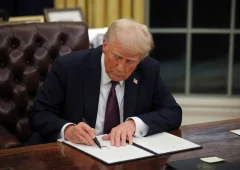Senate Confirms Crypto-Linked Nominee Jonathan Gould to Head OCC
11.07.2025 9:00 2 min. read Kosta Gushterov
The U.S. Senate has confirmed Jonathan Gould as the next head of the Office of the Comptroller of the Currency (OCC), moving his nomination to President Donald Trump for final approval.
In a narrow 50–45 vote on Thursday, the Senate backed Gould, a former blockchain executive and longtime financial regulator. Gould previously served as chief legal officer at crypto infrastructure firm Bitfury and held senior roles at the OCC, including as senior deputy comptroller and chief counsel. President Trump nominated him for the role in February.
Despite her reputation as a pro-crypto lawmaker, Sen. Cynthia Lummis voted against Gould’s nomination during a procedural vote earlier in the day, as reported by Brendan Pedersen of Punchbowl News.
Under Gould’s potential leadership, the OCC may continue embracing digital assets. The agency has already taken several crypto-friendly steps this year, including issuing guidance that allows U.S. banks to buy and sell crypto assets on their own behalf.
Recent months have seen a steady increase in regulatory clarity for the U.S. crypto industry, particularly from banking and financial oversight bodies. The Office of the Comptroller of the Currency (OCC) issued new guidance this year allowing national banks to buy and sell cryptocurrencies on their own behalf, a move seen as a green light for broader institutional participation.
Meanwhile, the Securities and Exchange Commission (SEC) faces growing pressure to define clear rules for crypto assets, with calls from lawmakers and market participants to adopt a more industry-specific approach.
The Commodity Futures Trading Commission (CFTC), under Chairman Rostin Behnam, has also ramped up enforcement efforts while signaling support for a dual regulatory framework. According to Reuters and Bloomberg, bipartisan momentum is building behind legislation that would assign primary oversight of crypto spot markets to the CFTC—a shift that could reshape the regulatory landscape for digital assets in the United States.
-
1
Japan Plans Major Crypto Reform with New Tax Rules and ETF Access
24.06.2025 20:00 2 min. read -
2
Gemini Launches Tokenized MicroStrategy Stock for EU Users
28.06.2025 9:30 2 min. read -
3
Here is When the U.S. House Will Vote on Key Crypto Bills
04.07.2025 12:00 2 min. read -
4
U.S. Crypto Investors Hit by IRS Letter Surge as Tax Crackdown Looms
29.06.2025 11:00 3 min. read -
5
Ripple Drops Cross-Appeal, Moves to End SEC Case “Once and for All”
28.06.2025 12:30 2 min. read
Australia Tests CBDCs in 24 Separate Real-World Finance Use Cases
Australia is stepping up its digital currency efforts with the next phase of Project Acacia, a pilot focused on testing central bank digital currency (CBDC) and tokenized finance in real-world applications.
U.S. Treasury Eliminates Crypto Reporting Rule Targeting Decentralized Exchanges
According to Bloomberg the U.S. Treasury Department has officially eliminated a controversial crypto reporting requirement that targeted decentralized exchanges.
U.S. Lawmakers Target El Salvador With Crypto Sanctions Plan
Three Democratic senators—Chris Van Hollen, Tim Kaine, and Alex Padilla—unveiled a bill aiming to penalize El Salvador’s President Nayib Bukele and his allies.
Crypto Tax Policy in Spotlight as House Plans July 16 Hearing
As U.S. lawmakers gear up for what’s being dubbed “Crypto Week,” the House of Representatives is turning its focus to a long-standing industry concern: taxation of digital assets.
-
1
Japan Plans Major Crypto Reform with New Tax Rules and ETF Access
24.06.2025 20:00 2 min. read -
2
Gemini Launches Tokenized MicroStrategy Stock for EU Users
28.06.2025 9:30 2 min. read -
3
Here is When the U.S. House Will Vote on Key Crypto Bills
04.07.2025 12:00 2 min. read -
4
U.S. Crypto Investors Hit by IRS Letter Surge as Tax Crackdown Looms
29.06.2025 11:00 3 min. read -
5
Ripple Drops Cross-Appeal, Moves to End SEC Case “Once and for All”
28.06.2025 12:30 2 min. read


